HE playing field between men/women needs to be levelled
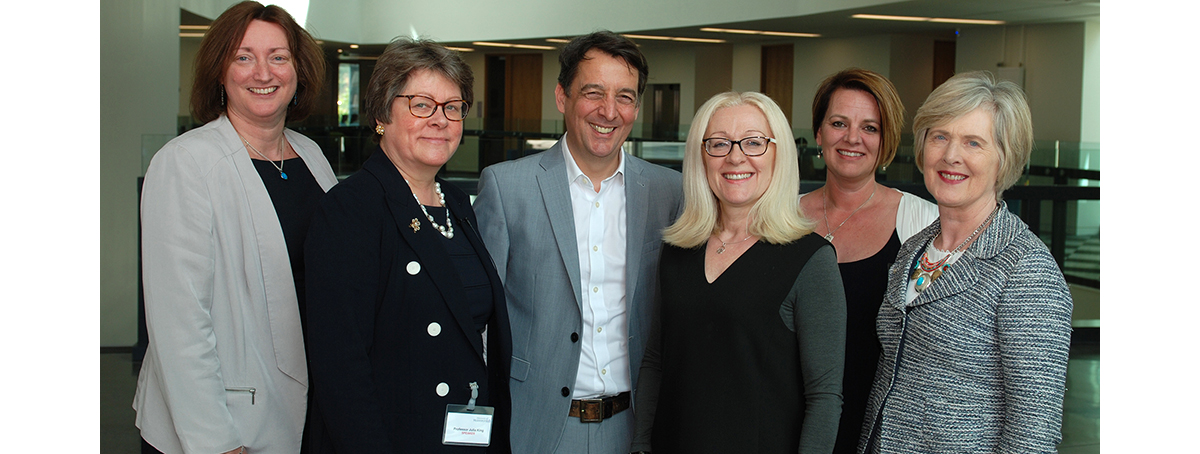 The University's Athena SWAN conference organisers, Professor Jane Owen-Lynch (left) and Dr Gemma Sweeney (second right), are pictured with speakers (l-r) Baroness Brown, Professor Paul Walton, Professor Caroline Gatrell and Professor Yvonne Galligan
The University's Athena SWAN conference organisers, Professor Jane Owen-Lynch (left) and Dr Gemma Sweeney (second right), are pictured with speakers (l-r) Baroness Brown, Professor Paul Walton, Professor Caroline Gatrell and Professor Yvonne Galligan
Mon, 08 May 2017 16:18:00 BST
Speakers at the University’s Athena SWAN conference rail against gender inequality throughout the sector
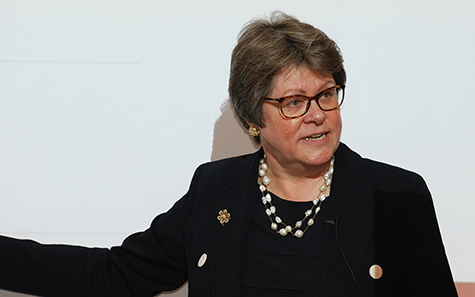 GREATER gender diversity in research teams and on management bodies can lead to better science and to better-run companies and organisations, providing a boost to the economy. But measures such as the appointment of special diversity observers in order to prevent “unconscious bias” are needed, according to expert speakers at a University of Huddersfield conference that focussed on the issues.
GREATER gender diversity in research teams and on management bodies can lead to better science and to better-run companies and organisations, providing a boost to the economy. But measures such as the appointment of special diversity observers in order to prevent “unconscious bias” are needed, according to expert speakers at a University of Huddersfield conference that focussed on the issues.
Titled Equality: Everyone’s job, no-one’s responsibility, the event was organised by the University’s Athena SWAN committee, which has the task of ensuring gender equality in its schools and departments. It was the first major event to be held in the new, £28 million Oastler Building and drew a large attendance from universities and other institutions in the region.
The keynote speaker was Baroness Brown of Cambridge (pictured left), Professor Dame Julia King, who has had a distinguished career in engineering and academia. She used her career progression to illustrate a call for greater diversity in her profession.
Engineering needs more women, she said, because diverse teams were more creative and better at innovation and problem solving. But they also presented a challenge. “It’s hard work managing diversity!” said the Baroness, whose career has included senior positions with Rolls Royce.
She advised potential investors in a company to examine the make-up of its management. “Gender diversity in management teams leads to better performance.”
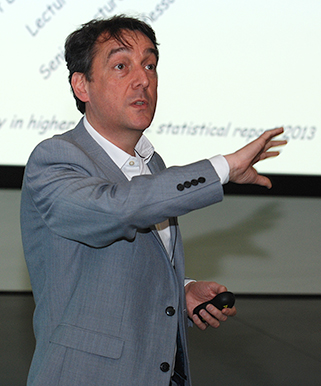 Baroness Brown said that for the playing field between men and women to be levelled, it was hugely important to publish data on salary differentials. It was also vital to encourage women and to monitor promotion processes.
Baroness Brown said that for the playing field between men and women to be levelled, it was hugely important to publish data on salary differentials. It was also vital to encourage women and to monitor promotion processes.
Unconscious bias
An earlier speaker, Professor Paul Walton (pictured right), had argued the need for unconscious bias observers on all university decision-making committees, especially promotion panels.
A scientist who is also a leading campaigner for gender equality, Professor Walton presented data to illustrate the problem that has been dubbed the “leaky pipeline” – signifying that although there is a gender balance at undergraduate level, further down the career path, the great majority of professors in subjects such as chemistry are male.
There are no biological differences between men and women when it comes to ability in maths or other subjects, said Professor Walton. So he analysed the role of unconscious bias, which can be exacerbated by factors such as tiredness and stress, meaning there was a need for special observers to be part of the promotion process.
Professor Walton also stressed the importance of data on pay differentials as the most powerful way to galvanise opinion over gender inequality.
Daily sexism
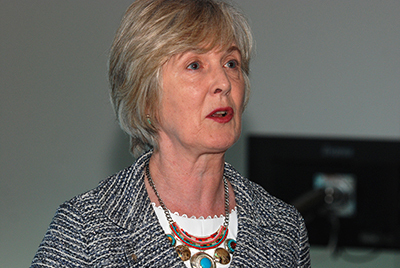 The first speaker at the conference was Professor Yvonne Galligan (pictured left) OBE of Queen’s University, Belfast. She has published extensively on “gender democracy”, and she had figures to illustrate the “leaky pipeline” problem – for example, women make up the majority of students, and almost half of full-time academics, but white men are much more likely to become professors.
The first speaker at the conference was Professor Yvonne Galligan (pictured left) OBE of Queen’s University, Belfast. She has published extensively on “gender democracy”, and she had figures to illustrate the “leaky pipeline” problem – for example, women make up the majority of students, and almost half of full-time academics, but white men are much more likely to become professors.
She spoke about the “daily sexism” that can depress the career aspirations of women and other under-represented groups and advocated interventions to change cultural behaviour, such as designated equality advisers.
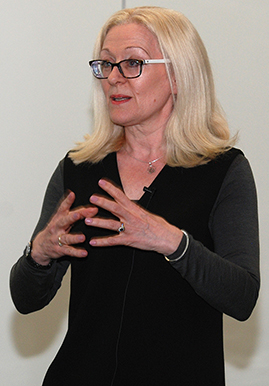 Choosing between science and women was a false dichotomy, said Professor Galligan. “Mixed research teams get better results. And better science is what universities are all about.” Also, the values adopted by Higher Education could shape those of society as a whole, and the economic gains of increasing the participation of women in the UK labour market could amount to £23 billion, she claimed.
Choosing between science and women was a false dichotomy, said Professor Galligan. “Mixed research teams get better results. And better science is what universities are all about.” Also, the values adopted by Higher Education could shape those of society as a whole, and the economic gains of increasing the participation of women in the UK labour market could amount to £23 billion, she claimed.
The final speaker at the Athena SWAN conference was Professor Caroline Gatrell (pictured right) of the Management School of the University of Liverpool, who gave an account of her research career, in which she has investigated the challenges of combining motherhood with academic research.
She spoke of the special difficulties that can face women in academia and she relayed a number of strategies: “Don’t give up, don’t be side-tracked, hold your nerve and keep going.”
The conference was introduced by the Vice-Chancellor of the University of Huddersfield, Professor Bob Cryan, who affirmed its commitment to the process of obtaining the Athena SWAN awards bestowed by the Equality Challenge Unit.
The University already has the Bronze Award and is working towards Silver, said Professor Cryan. An Athena Self-Assessment Panel met regularly throughout the year and draws its membership from academic and professional support staff throughout the University.
“Commitment to equality of opportunity needs to be deeply embedded in our institutional philosophy, and I am confident that this is happening at Huddersfield,” said Professor Cryan.







